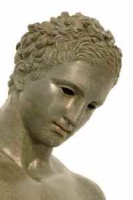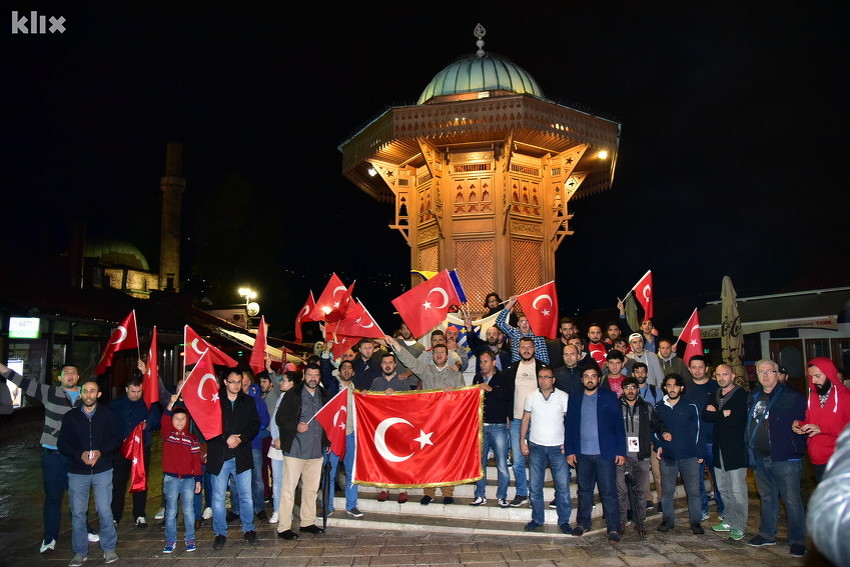počeo demokratski protuudar u Turskoj - otpušteno 2700 sudaca
Page 2 of 4
Page 2 of 4 •  1, 2, 3, 4
1, 2, 3, 4 
 Re: počeo demokratski protuudar u Turskoj - otpušteno 2700 sudaca
Re: počeo demokratski protuudar u Turskoj - otpušteno 2700 sudaca
Šeks to zna elegantnije riješiti...
darth_vader- Posts : 19761
2014-04-17
 Re: počeo demokratski protuudar u Turskoj - otpušteno 2700 sudaca
Re: počeo demokratski protuudar u Turskoj - otpušteno 2700 sudaca
jasambrend wrote:Šeks to zna elegantnije riješiti...
apsolutno
_________________


marcellus- Posts : 46005
2014-04-16
 Re: počeo demokratski protuudar u Turskoj - otpušteno 2700 sudaca
Re: počeo demokratski protuudar u Turskoj - otpušteno 2700 sudaca
[size=48]Turkey coup: Soldier 'beheaded by government supporters', pictures shared on Twitter suggest[/size]
The soldiers, who had blocked the bridge over the Bosphorus throughout the coup, surrendered earlier on Saturday
http://www.independent.co.uk/news/world/europe/turkey-coup-latest-news-istanbul-ankara-erdogan-twitter-beheading-social-media-a7140541.html
The soldiers, who had blocked the bridge over the Bosphorus throughout the coup, surrendered earlier on Saturday
http://www.independent.co.uk/news/world/europe/turkey-coup-latest-news-istanbul-ankara-erdogan-twitter-beheading-social-media-a7140541.html

Kermit-

Posts : 26479
2014-04-17
 Re: počeo demokratski protuudar u Turskoj - otpušteno 2700 sudaca
Re: počeo demokratski protuudar u Turskoj - otpušteno 2700 sudaca
ARGUMENT
Erdogan Has Nobody to Blame for the Coup But Himself
After years of broken promises and deepening paranoia, the Turkish president earned his comeuppance.
This is not what President Recep Tayyip Erdogan meant when he said he wanted to transform Turkey. The tanks and gunfire in the streets of Ankara mark the fifth time since 1960 that the Turkish military has attempted to stage a coup. Even if this one proves unsuccessful — and the elected government now seems likely to come out on top — it calls into question the stability of Erdogan’s political movement. How exactly did a leader who began his rule 13 years ago with such promise derail so badly?
Erdogan’s Justice and Development Party (AKP) swept to power on November 3, 2002. The AKP won 34 percent of the vote, not because one-third of Turkish voters necessarily supported Erdogan’s conservative religious and social positions, but rather because they wanted change. The previous years had seen repeated corruption scandals, banking crises, and a precipitous decline in the value of the Turkish lira against the U.S. dollar.
Erdogan was initially banned from holding public office because of a trumped up religious incitement conviction during his time as mayor of Istanbul, but he nonetheless promised good, clean governance and a fresh start. Many Turks fed up with the establishment, decided to give the AKP a try.
The AKP also got lucky. The reason, ironically, dates back to the 1980 coup against which Erdogan so often rails. After the Turkish military ousted the Turkish government, it imposed a new constitution seeking to stabilize Turkey’s volatile politics. In order to prevent a fragmented parliament or create a situation in which governments could become beholden to tiny, niche parties (as has sometimes been the case in Israel), the 1982 constitution imposed by the military mandated that all parties would need to receive 10 percent of the vote to enter parliament. Those that did not — and, in the 2002 elections, five parties got between 5 and 9 percent — would have their seats redistributed. Long story short, one-third of the votes transformed into a two-thirds grip on parliament. That enabled the AKP to do pretty much whatever it wanted. One of its first actions? Change the law in order to allow Erdogan to enter government.
Still, Erdogan won plaudits. He stabilized the currency, and then knocked six zeros off the Turkish lira. That meant Turks no longer had to be millionaires to buy a Coke. He also embraced a pro-business agenda that not only made investment easier, but also ensured that the state and its private partners spread investment around. Many of the old Turkish elite lived and invested in European Turkey, but seldom ventured far into central Anatolia, except perhaps for a quick visit to Ankara. The AKP and its partners, however, pumped money into Anatolia, in cities like Konya and Kayseri. Turks not only got rich, but for the first time, parts of the population that had long been ignored or trampled upon felt they got respect.
When it came to the economy, however, Erdogan also got lucky. As Turkey’s economy developed, birthrates fell, and as longevity increased, so did the working age population. It was an economic boom, similar to that which propelled the East Asian “Tigers” to prosperity in the last decades of the 20th century.
It also, however, masked some deeply troubling trends. While Turkey’s debt-to-GDP ratio is relative low at around 33 percent — a statistic that makes Greek, Spanish, Portuguese, let alone American economists drool — private debt has skyrocketed, according to bank analysts. Most Turks are heavily leveraged and see no hope to pay off the interest on their loans. This meant that even if official statistics looked bright, Turks increasingly sense dark clouds on the horizon.
Then, there was Erdogan’s arrogance. As he and his party won election after election, he dropped any pretense of governing for all Turks. “I will raise a religious generation,” he declared, turning his back on the secularism that Kemal Ataturk, the founder of the Turkish republic, imposed on the country more than 90 years ago. Rather than address the 1,400 percent increase in the murder rate of women, he instructed women to stay at home and have three children, and railed not only against abortions, but also C-sections, as violations of God’s will. He simply no longer cared what Turkish liberals thought, nor saw any need to represent them.
The same held true for the press. Many Turks initially supported Erdogan out of animosity toward the military and a belief that his commitment to reform was real. They soon learned, however, that Erdogan wanted not a free press, but rather an obsequious one. Even minor criticism could mean legal trouble. Turkey today has more reporters in prison on a per capita basis than any other country.
It didn’t help matters that Erdogan clearly relished a fight. The 2013 Gezi Park uprising began as an environmental protest to save one of central Istanbul’s few remaining green spaces, but heavy-handed police tactics transformed it into something far greater. After then-President Abdullah Gül’s conciliatory words calmed the situation, Erdoğan seemed to deliberately fan the flames.
He also turned on friends quickly. Take the followers of Fethullah Gülen, a Turkish theologian (now living in Pennsylvania) who preaches peace and religious tolerance. Both Erdoğan and Gülen suffered at the hands of the military, and they worked fist-in-glove to unravel the military’s influence in politics. As soon as Erdoğan no longer needed Gülen’s followers, however, he turned on them, confiscating business and assets, arresting them on trumped up charges, and labeling them as terrorists.
His Kurdish policy suffered from the same cynicism. Kurds found hope in Erdogan’s promises to resolve their decades-long grievances. He even began secret negotiations with Abdullah Ocalan, the outlawed Kurdistan Workers Party’s (PKK) imprisoned leader. Promises fell by the wayside after each election, however, and when Turkish Kurds responded by voting for the Peoples’ Democracy Party (HDP), an overwhelmingly ethnic party rather than the AKP, he turned on them with vengeance, transforming southeastern Turkey into a war zone reminiscent of the worst days of the 1980s.
The biggest problem, however, may have been Erdogan’s foreign policy. He promised “no problems with neighbors” only to enmesh Turkey in problems with almost every neighbor. Tourism revenues plunged as first Israelis, then Russians and, after the Istanbul bombings, almost everyone else, spent their holidays elsewhere.
The recent wave of terrorism may have been the last straw. Erdoğan’s increasing sectarianism — and his personal animosity both toward Syrian Kurds and the regime of Syrian President Bashar al-Assad — led him to see radical groups inside Syria like the Nusra Front, and even the Islamic State, as useful tools. As Saudi Arabia, Pakistan, and Syria long ago discovered, however, blowback is real. Suicide attacks in Ankara and Istanbul convinced many Turks that the peace and security Erdogan promised them was illusionary.
Was a coup inevitable? No. But those plotting it presumably believed they were saving Turkey from an increasingly out-of-touch and ideological leadership. Erdogan promised to rule on behalf of all Turks, but increasingly he does not. He promised to repair the economy, but corruption is rife, the currency shaky, and a recession could be on the horizon. He promised peace, but his combative policies isolated Turkey in the Middle East and estranged it from the West. He promised security, but Turks fear recent bombings are just the tip of the iceberg. At the same time, the coup plotters may believe that Erdoğan’s continual consolidation of power made this their last chance.
Whether Erdogan remains in power or not, there’s a cautionary tale here. All leaders risk being trapped in a bubble of sycophancy. A free press enables leaders the ability to cut through flattery and calibrate policy to reality. Erdogan, however, lost not only that window to Turkey, but also to the world. Now comes the real danger, however. Should the coup succeed, Turkey will remain divided with no obvious leader to bridge the gap. But should Erdogan survive the coup, his gut reactions may be to accelerate his crackdown and to believe in conspiracies of all sorts — not only those grounded in reality, but also the many that live only in his own florid imagination.
http://foreignpolicy.com/2016/07/15/erdogan-has-nobody-to-blame-for-the-coup-but-himself/?utm_content=buffer76d58&utm_medium=social&utm_source=twitter.com&utm_campaign=buffer
Erdogan Has Nobody to Blame for the Coup But Himself
After years of broken promises and deepening paranoia, the Turkish president earned his comeuppance.
This is not what President Recep Tayyip Erdogan meant when he said he wanted to transform Turkey. The tanks and gunfire in the streets of Ankara mark the fifth time since 1960 that the Turkish military has attempted to stage a coup. Even if this one proves unsuccessful — and the elected government now seems likely to come out on top — it calls into question the stability of Erdogan’s political movement. How exactly did a leader who began his rule 13 years ago with such promise derail so badly?
Erdogan’s Justice and Development Party (AKP) swept to power on November 3, 2002. The AKP won 34 percent of the vote, not because one-third of Turkish voters necessarily supported Erdogan’s conservative religious and social positions, but rather because they wanted change. The previous years had seen repeated corruption scandals, banking crises, and a precipitous decline in the value of the Turkish lira against the U.S. dollar.
Erdogan was initially banned from holding public office because of a trumped up religious incitement conviction during his time as mayor of Istanbul, but he nonetheless promised good, clean governance and a fresh start. Many Turks fed up with the establishment, decided to give the AKP a try.
The AKP also got lucky. The reason, ironically, dates back to the 1980 coup against which Erdogan so often rails. After the Turkish military ousted the Turkish government, it imposed a new constitution seeking to stabilize Turkey’s volatile politics. In order to prevent a fragmented parliament or create a situation in which governments could become beholden to tiny, niche parties (as has sometimes been the case in Israel), the 1982 constitution imposed by the military mandated that all parties would need to receive 10 percent of the vote to enter parliament. Those that did not — and, in the 2002 elections, five parties got between 5 and 9 percent — would have their seats redistributed. Long story short, one-third of the votes transformed into a two-thirds grip on parliament. That enabled the AKP to do pretty much whatever it wanted. One of its first actions? Change the law in order to allow Erdogan to enter government.
Still, Erdogan won plaudits. He stabilized the currency, and then knocked six zeros off the Turkish lira. That meant Turks no longer had to be millionaires to buy a Coke. He also embraced a pro-business agenda that not only made investment easier, but also ensured that the state and its private partners spread investment around. Many of the old Turkish elite lived and invested in European Turkey, but seldom ventured far into central Anatolia, except perhaps for a quick visit to Ankara. The AKP and its partners, however, pumped money into Anatolia, in cities like Konya and Kayseri. Turks not only got rich, but for the first time, parts of the population that had long been ignored or trampled upon felt they got respect.
When it came to the economy, however, Erdogan also got lucky. As Turkey’s economy developed, birthrates fell, and as longevity increased, so did the working age population. It was an economic boom, similar to that which propelled the East Asian “Tigers” to prosperity in the last decades of the 20th century.
It also, however, masked some deeply troubling trends. While Turkey’s debt-to-GDP ratio is relative low at around 33 percent — a statistic that makes Greek, Spanish, Portuguese, let alone American economists drool — private debt has skyrocketed, according to bank analysts. Most Turks are heavily leveraged and see no hope to pay off the interest on their loans. This meant that even if official statistics looked bright, Turks increasingly sense dark clouds on the horizon.
Then, there was Erdogan’s arrogance. As he and his party won election after election, he dropped any pretense of governing for all Turks. “I will raise a religious generation,” he declared, turning his back on the secularism that Kemal Ataturk, the founder of the Turkish republic, imposed on the country more than 90 years ago. Rather than address the 1,400 percent increase in the murder rate of women, he instructed women to stay at home and have three children, and railed not only against abortions, but also C-sections, as violations of God’s will. He simply no longer cared what Turkish liberals thought, nor saw any need to represent them.
The same held true for the press. Many Turks initially supported Erdogan out of animosity toward the military and a belief that his commitment to reform was real. They soon learned, however, that Erdogan wanted not a free press, but rather an obsequious one. Even minor criticism could mean legal trouble. Turkey today has more reporters in prison on a per capita basis than any other country.
It didn’t help matters that Erdogan clearly relished a fight. The 2013 Gezi Park uprising began as an environmental protest to save one of central Istanbul’s few remaining green spaces, but heavy-handed police tactics transformed it into something far greater. After then-President Abdullah Gül’s conciliatory words calmed the situation, Erdoğan seemed to deliberately fan the flames.
He also turned on friends quickly. Take the followers of Fethullah Gülen, a Turkish theologian (now living in Pennsylvania) who preaches peace and religious tolerance. Both Erdoğan and Gülen suffered at the hands of the military, and they worked fist-in-glove to unravel the military’s influence in politics. As soon as Erdoğan no longer needed Gülen’s followers, however, he turned on them, confiscating business and assets, arresting them on trumped up charges, and labeling them as terrorists.
His Kurdish policy suffered from the same cynicism. Kurds found hope in Erdogan’s promises to resolve their decades-long grievances. He even began secret negotiations with Abdullah Ocalan, the outlawed Kurdistan Workers Party’s (PKK) imprisoned leader. Promises fell by the wayside after each election, however, and when Turkish Kurds responded by voting for the Peoples’ Democracy Party (HDP), an overwhelmingly ethnic party rather than the AKP, he turned on them with vengeance, transforming southeastern Turkey into a war zone reminiscent of the worst days of the 1980s.
The biggest problem, however, may have been Erdogan’s foreign policy. He promised “no problems with neighbors” only to enmesh Turkey in problems with almost every neighbor. Tourism revenues plunged as first Israelis, then Russians and, after the Istanbul bombings, almost everyone else, spent their holidays elsewhere.
The recent wave of terrorism may have been the last straw. Erdoğan’s increasing sectarianism — and his personal animosity both toward Syrian Kurds and the regime of Syrian President Bashar al-Assad — led him to see radical groups inside Syria like the Nusra Front, and even the Islamic State, as useful tools. As Saudi Arabia, Pakistan, and Syria long ago discovered, however, blowback is real. Suicide attacks in Ankara and Istanbul convinced many Turks that the peace and security Erdogan promised them was illusionary.
Was a coup inevitable? No. But those plotting it presumably believed they were saving Turkey from an increasingly out-of-touch and ideological leadership. Erdogan promised to rule on behalf of all Turks, but increasingly he does not. He promised to repair the economy, but corruption is rife, the currency shaky, and a recession could be on the horizon. He promised peace, but his combative policies isolated Turkey in the Middle East and estranged it from the West. He promised security, but Turks fear recent bombings are just the tip of the iceberg. At the same time, the coup plotters may believe that Erdoğan’s continual consolidation of power made this their last chance.
Whether Erdogan remains in power or not, there’s a cautionary tale here. All leaders risk being trapped in a bubble of sycophancy. A free press enables leaders the ability to cut through flattery and calibrate policy to reality. Erdogan, however, lost not only that window to Turkey, but also to the world. Now comes the real danger, however. Should the coup succeed, Turkey will remain divided with no obvious leader to bridge the gap. But should Erdogan survive the coup, his gut reactions may be to accelerate his crackdown and to believe in conspiracies of all sorts — not only those grounded in reality, but also the many that live only in his own florid imagination.
http://foreignpolicy.com/2016/07/15/erdogan-has-nobody-to-blame-for-the-coup-but-himself/?utm_content=buffer76d58&utm_medium=social&utm_source=twitter.com&utm_campaign=buffer

Guest- Guest
 Re: počeo demokratski protuudar u Turskoj - otpušteno 2700 sudaca
Re: počeo demokratski protuudar u Turskoj - otpušteno 2700 sudaca
[size=48]Al Kaida stala iz erdogana:[/size]
Elijah J. Magnier [ltr]@EjmAlrai[/ltr] 6 h[size=1]prije 6 sati[/size]
Jabhat al-Nusra #AQ spiritual scholar al-Maqdisi attacked the Turkish Army responsible of the coup as "anti-Islamic"
Elijah J. Magnier [ltr]@EjmAlrai[/ltr] 6 h[size=1]prije 6 sati[/size]
Jabhat al-Nusra #AQ spiritual scholar al-Maqdisi attacked the Turkish Army responsible of the coup as "anti-Islamic"

Kermit-

Posts : 26479
2014-04-17
 Re: počeo demokratski protuudar u Turskoj - otpušteno 2700 sudaca
Re: počeo demokratski protuudar u Turskoj - otpušteno 2700 sudaca
zato je i propao, puč je bio anti-islamski, pa ga alah nije blagoslovio

Guest- Guest
 Re: počeo demokratski protuudar u Turskoj - otpušteno 2700 sudaca
Re: počeo demokratski protuudar u Turskoj - otpušteno 2700 sudaca
obzirom na Erdoganov i islamisticki teror nakon neuspjeha prevrata ,spekulira se da je sve bilo namjesteno od strane islamisticke aktualne vlade ,demokratski izabrane ;
http://www.vijesti.rtl.hr/novosti/svijet/1955203/vise-od-265-mrtvih-u-turskoj-vlasti-smijenile-2745-sudaca-sve-je-vise-onih-koji-smatraju-da-je-erdogan-organizirao-lazni-puc/
http://www.vijesti.rtl.hr/novosti/svijet/1955203/vise-od-265-mrtvih-u-turskoj-vlasti-smijenile-2745-sudaca-sve-je-vise-onih-koji-smatraju-da-je-erdogan-organizirao-lazni-puc/

Clone Stormtrooper-

Posts : 738
2016-02-19
 Re: počeo demokratski protuudar u Turskoj - otpušteno 2700 sudaca
Re: počeo demokratski protuudar u Turskoj - otpušteno 2700 sudaca
Tih tri tisuće streljat po kratkom postupku a onda stvaranje jake islamističke PATRIJAHALNE Turske kao brane EMANICPACIJI I MATRIJAHALNOJ IMPERIJI.

RayMabus- Posts : 184105
2014-04-11
 Re: počeo demokratski protuudar u Turskoj - otpušteno 2700 sudaca
Re: počeo demokratski protuudar u Turskoj - otpušteno 2700 sudaca
Sad kad je Erdogan obranio demokratski poredak od vojne titoističke diktature stvarno bi bio red da se ukinu vize Turcima za ulaz u EU.
_________________


udba- Posts : 4945
2015-11-10
 Re: počeo demokratski protuudar u Turskoj - otpušteno 2700 sudaca
Re: počeo demokratski protuudar u Turskoj - otpušteno 2700 sudaca
Pobeda patrijaha nad emancipacijom i matrijahlnom imperijom.
Erdogan.
Erdogan.


RayMabus- Posts : 184105
2014-04-11
 Re: počeo demokratski protuudar u Turskoj - otpušteno 2700 sudaca
Re: počeo demokratski protuudar u Turskoj - otpušteno 2700 sudaca
ERDOGANOVE PRISTALICE KAO DAIŠ-evci: Nasmrt pretukli i obezglavili turskog vojnika
 UREDNIK: AMEL H. / KOMENTARA (0) / OBJAVLJENO : 16. 07. 2016.
UREDNIK: AMEL H. / KOMENTARA (0) / OBJAVLJENO : 16. 07. 2016.






Britanski Independent i drugi svjetski mediji prenose vijest da su okupljeni građani jutros na jednom od istanbulskih mostova nasmrt pretukli i obezglavili jednog od vojnika koji su učestvovali u neuspješnom državnom udaru.

Na fotografiji koja je prvo objavljena na društvenim mrežama vidi se jedan od vojnika koji je obezglavljen. Također, na drugim fotografijama koje prenose svjetske agencije vide se građani dok tuku vojnike koji su se predali.

Vojnici koji su pokušali vojni udar i koji su blokirali mostove predali su se rano jutros.

Dio vojske koji je blokirao mostove sinoć je navodno pucao na okupljene građane, a u sukobima je stradalo 47 civila. Još nismo vidjeli ni jednu fotografiju mrtvog civila, kao ni snimke, pa se pitamo gdje nestadoše tolika tijela. Ili je i to dio predstave.



Kermit-

Posts : 26479
2014-04-17
 Re: počeo demokratski protuudar u Turskoj - otpušteno 2700 sudaca
Re: počeo demokratski protuudar u Turskoj - otpušteno 2700 sudaca
Ataturkova sekularna Turska šta je prelaz iz patrijaha u materijalnu imperiju je mrtva.
Zlo je zaustavljeno na Bosporu.
Zlo je zaustavljeno na Bosporu.

RayMabus- Posts : 184105
2014-04-11
 Re: počeo demokratski protuudar u Turskoj - otpušteno 2700 sudaca
Re: počeo demokratski protuudar u Turskoj - otpušteno 2700 sudaca
A matrijahalnoj imperiji evo još malo kolača :
Italija: Utopilo se najmanje 20 migranata, spaseno 366 njih
Tanjug | 16. 07. 2016 - 17:14h
Italijanska policija je saopštila da je iz poluraspadnutih čamaca kojima su migranti pokušali da pređu Sredozemno more i stignu do Italije spaseno 366 osoba, ali da se najmanje 20 ljudi udavilo, javio je Rojters.
http://www.blic.rs/vesti/svet/italija-utopilo-se-najmanje-20-migranata-spaseno-366-njih/lmy8004
Trpaj.
Italija: Utopilo se najmanje 20 migranata, spaseno 366 njih
Tanjug | 16. 07. 2016 - 17:14h
Italijanska policija je saopštila da je iz poluraspadnutih čamaca kojima su migranti pokušali da pređu Sredozemno more i stignu do Italije spaseno 366 osoba, ali da se najmanje 20 ljudi udavilo, javio je Rojters.
http://www.blic.rs/vesti/svet/italija-utopilo-se-najmanje-20-migranata-spaseno-366-njih/lmy8004
Trpaj.

RayMabus- Posts : 184105
2014-04-11
 Re: počeo demokratski protuudar u Turskoj - otpušteno 2700 sudaca
Re: počeo demokratski protuudar u Turskoj - otpušteno 2700 sudaca
Lustracija, nego šta.udba wrote:Sad kad je Erdogan obranio demokratski poredak od vojne titoističke diktature stvarno bi bio red da se ukinu vize Turcima za ulaz u EU.

_________________
Jedan je Hase...

Ero- Posts : 13866
2014-04-23
 Re: počeo demokratski protuudar u Turskoj - otpušteno 2700 sudaca
Re: počeo demokratski protuudar u Turskoj - otpušteno 2700 sudaca

http://www.blic.rs/vesti/svet/jeziv-video-islamista-neposredno-pre-napada-u-nici-napunite-kola-benzinom-i-gazite-ih/esvemzp

RayMabus- Posts : 184105
2014-04-11
 Re: počeo demokratski protuudar u Turskoj - otpušteno 2700 sudaca
Re: počeo demokratski protuudar u Turskoj - otpušteno 2700 sudaca
Rijeka ovih dana igra treće pretkolo za ligu UEFA,protivnik je turski Basaksehir.
Trebalo bi na Rujevicu dovesti gluslara i otpjevati Od glave Zete do grada Spuža.
Utakmicu bi trebalo pretvoriti u opći antierdoganski miting.
Trebalo bi na Rujevicu dovesti gluslara i otpjevati Od glave Zete do grada Spuža.
Utakmicu bi trebalo pretvoriti u opći antierdoganski miting.

jastreb- Posts : 34059
2014-04-22
 Re: počeo demokratski protuudar u Turskoj - otpušteno 2700 sudaca
Re: počeo demokratski protuudar u Turskoj - otpušteno 2700 sudaca
| Ova turska vojska je stvarno nesposobnija nego što sam mislio. Kad vidim nesposobnost i šlamperaj, nebih se čudio da je to Erdogan sve iscenirao samo da umanji moć vojske i postane apsolutni capo. Vojsku se uvijek nešto pitalo u Turskoj, mislim da više neće. |
Igrokaz za micanje oporbe...
--------------------------------------------------------------------------
Preuzeto sa drugog portala.
No kako sam i rekao - FALSE FLAG
--------------------------------------------
SERDOGANOVE BANDE I PARAVOJNE POSTROJBE + AKTIVISTI STRANKE
UBILI I OBEZGLAVILI JEDNOGA VOJNIKA ( KOJI VJEROJATNO POJMA NIJE IMAO
O ČEMU SE RADI NI ZAŠTO SU GA PROBUDILI I POSLALI NA MOST STRAŽARITI
__________________

Yehudi- Posts : 14715
2014-04-20
 Re: počeo demokratski protuudar u Turskoj - otpušteno 2700 sudaca
Re: počeo demokratski protuudar u Turskoj - otpušteno 2700 sudaca
One poturice u Sarajevu,vidim slave i mašu turskim barjacima kao i pred 150 godina.

jastreb- Posts : 34059
2014-04-22
 Re: počeo demokratski protuudar u Turskoj - otpušteno 2700 sudaca
Re: počeo demokratski protuudar u Turskoj - otpušteno 2700 sudaca
..zavezane s hrvatskim iste će bit nepremostiva brana za velikosrpske komunističke horde.jastreb wrote:One poturice u Sarajevu,vidim slave i mašu turskim barjacima kao i pred 150 godina.

udba- Posts : 4945
2015-11-10
 Re: počeo demokratski protuudar u Turskoj - otpušteno 2700 sudaca
Re: počeo demokratski protuudar u Turskoj - otpušteno 2700 sudaca
udba wrote:..zavezane s hrvatskim iste će bit nepremostiva brana za velikosrpske komunističke horde.jastreb wrote:One poturice u Sarajevu,vidim slave i mašu turskim barjacima kao i pred 150 godina.
[size=30]Sarajevo: Građani BiH i Turske ispred Sebilja pružili podršku Erdoganu[/size]
| 16. Juli 2016 |

Turska, BiH – Nekoliko desetina Turaka i građana Bosne i Hercegovine večeras je ispred Sebilja pružilo podršku narodu Turske i predsjedniku Receppu Tayipu Erdoganu zbog novonastale situacije u toj zemlji.
Okupljeni ispred Sebilja uzvikivali su “Allahu Ekber”, a većina ih je nosila turske zastave i još neke transparente.
Podršku su im davali i članovi Akademije mladih Stranke demokratske akcije (SDA) Stari Grad Sarajevo.
Podsjećamo, u Turskoj je večeras došlo do državnog udara, a turski mediji su izvjestili da je vojska večeras blokirala strateške tačke u Istanbulu i Ankari te da se radi o državnom udaru. Civilne vlasti tvrde da se radi o pobuni dijela vojske, a predsjednik Erdogan pozvao je narod na ulice

jastreb- Posts : 34059
2014-04-22
 Re: počeo demokratski protuudar u Turskoj - otpušteno 2700 sudaca
Re: počeo demokratski protuudar u Turskoj - otpušteno 2700 sudaca
Bog vas kleo,pogani izrodi!

jastreb- Posts : 34059
2014-04-22
Page 2 of 4 •  1, 2, 3, 4
1, 2, 3, 4 
 Similar topics
Similar topics» Merkel prvi put otvoreno zaprijetila sankcijama Turskoj zbog zatvorenih njemackih drzavljana u Turskoj
» Paladino počeo raditi u Mostaru: 'Počeo bi i ranije da nismo imali probleme'
» Demokratski val na izborima u Americi
» Otkriven 2700 godina star otisak pečata upravitelja Jeruzalema
» DODIK: BIH nestaje, predlažem miran demokratski razlaz
» Paladino počeo raditi u Mostaru: 'Počeo bi i ranije da nismo imali probleme'
» Demokratski val na izborima u Americi
» Otkriven 2700 godina star otisak pečata upravitelja Jeruzalema
» DODIK: BIH nestaje, predlažem miran demokratski razlaz
Page 2 of 4
Permissions in this forum:
You cannot reply to topics in this forum
 Events
Events Latest images
Latest images
 by darth_vader 16/7/2016, 16:37
by darth_vader 16/7/2016, 16:37